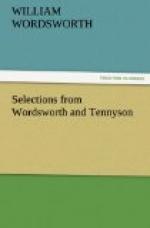“Tennyson always speaks from the side of virtue; and not of that new and strange virtue which some of our later poets have exalted, and which, when it is stripped of its fine garments, turns out to be nothing else than the unrestrained indulgence of every natural impulse; but rather of that old fashioned virtue whose laws are ’self-reverence, self-knowledge, self-control,’ and which finds its highest embodiment in the morality of the New Testament. There is a spiritual courage in his work, a force of fate which conquers doubt and darkness, a light of inward hope which burns dauntless under the shadow of death. Tennyson is the poet of faith; faith as distinguished from cold dogmatism and the acceptance of traditional creeds; faith which does not ignore doubt and mystery, but triumphs over them and faces the unknown with fearless heart. The effect of Christianity upon the poetry of Tennyson may be felt in its general moral quality. By this it is not meant that he is always preaching. But at the same time the poet can hardly help revealing, more by tone and accent than by definite words, his moral sympathies. He is essentially and characteristically a poet with a message. His poetry does not exist merely for the sake of its own perfection of form. It is something more than the sound of one who has a lovely voice and can play skilfully upon an instrument. It is a poetry with a meaning and a purpose. It is a voice that has something to say to us about life. When we read his poems we feel our hearts uplifted, we feel that, after all it is worth while to struggle towards the light, it is worth while to try to be upright and generous and true and loyal and pure, for virtue is victory and goodness is the only fadeless and immortal crown. The secret of the poet’s influence must lie in his spontaneous witness to the reality and supremacy of the moral life. His music must thrill us with the conviction that the humblest child of man has a duty, an ideal, a destiny. He must sing of justice and of love as a sure reward, a steadfast law, the safe port and haven of the soul.”—Henry Van Dyke.
REFERENCES ON TENNYSON’S LIFE AND WORKS
Alfred, Lord Tennyson: A Memoir by Hallam Tennyson. Toronto: The Macmillan Company of Canada, Limited. Price $2.00.
Tennyson and his Friends edited by Hallam, Lord Tennyson. Toronto: The Macmillan Company of Canada, Limited.
Alfred, Lord Tennyson: A Study of his Life and Works by Arthur Waugh. London: William Heinemann.
Tennyson by Sir Alfred Lyall in English Men of Letters series. Toronto: The Macmillan Company of Canada, Limited.
Alfred Tennyson by Arthur Christopher Benson in Little Biographies. London: Methuen & Co.
Alfred Tennyson: A Saintly Life by Robert F. Horton. London: J. M. Dent & Co.




